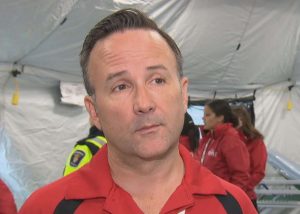Ontario hospitals hit by COVID-19 transferring record number of patients around province

Ontario hospitals are transferring an unprecedented number of patients within the province as the COVID-19 pandemic puts intense pressure on the health-care system.
Toronto, Peel to close businesses with 5 or more COVID-19 cases linked to the workplace
Doctors say the record number of patient transfers is happening as hospitals face a surge in hospitalizations and admissions to their intensive care units in the third wave. And they say they are concerned about what could happen if hospital resources are stretched further.
Hospitals in the Greater Toronto Area are now so full that they are transferring dozens of patients every day. Ornge, the organization in charge of patient transport, says patients are being moved mostly by its critical-care land ambulances, but also by its helicopters and airplanes, and with the help of local paramedic services.
Patients are being transferred from hospitals in the Greater Toronto Area to facilities in Kingston, London, St. Catharines, Barrie, Peterborough, Ottawa and Sudbury.
A total of 2,059 patients have been transferred since mid-November, when the Ontario government activated the GTA Hospital Incident Management System, according to Ontario Health. The system monitors bed capacity in Ontario.
Dr. Andrew Healey, chief of emergency services and an emergency and critical care doctor at the William Osler Health System, said on Tuesday that the transfers are having a huge impact on patients, families and hospitals.
“We’re transferring the largest number we’ve ever seen in the system, not only from Osler but also provincewide,” Healey said.
Eleven days ago, the province issued emergency orders allowing Ontario hospitals in danger of being overwhelmed by COVID-19 to transfer patients without their consent. This is the first time such an order has been made during the pandemic.
“People want to receive care at the hospital closest to their home. And this is the beginning of the stress that comes with this kind of transfer system.” Healey said.
“It also affects the layer of complexity that occurs within the hospital itself, obtaining consent where we can for transfer, getting patients to other facilities, ensuring that patients and families are well informed of that transfer, arranging the actual mechanism of transfer, the receiving physicians, ensuring their safe handover,” he said.
“The task is extremely complex. And the sicker the patient, the more complex that task. We have certainly seen times where different members of families are at three different hospitals, with one deteriorating in one hospital and another deteriorating in another and trying to have conversations.”
“I am very concerned about the potential for us to not be able to meet the demand of the pace at which patients will present through the front doors of our hospital,” he said.
“We are dangerously close to not being able to provide typical care in typical spaces to the patients who present with COVID-19 infection and others in our hospital system.”
With transport and hospital systems working flat out, there is concern about what would happen from a further spike in COVID-19 patients needing critical care. Healey said individual hospitals could become suddenly overwhelmed if they were to receive, hour after hour, a number of COVID-19 patients who need oxygen.
“Hospitals are already stressed and they’re working their hardest. And then we get a large influx internally of a major surge of people who require care. And that’s the situation that I’m most worried about and I think is almost an inevitability.”
William Osler has transferred 565 patients
Healey said the William Osler Health System has benefited the most from the patient transfer system. It has transferred 565 patients since mid-November. He said that reflects the size of its health system as well as the number of people becoming infected by the novel coronavirus.
Healey said hospitals are “trying to find the right patients to send that are safe for transport.” Many who are transferred have COVID-19 but not all. They include acute care and intensive care unit patients.
“We’re transferring out at a rate that closely approximates but doesn’t quite meet the demand of the patients coming through the front door. We’re taking care of over 200 acutely ill COVID patients across our system at the moment.”
Ornge recreates ICU in back of ambulance
Dr. Bruce Sawadsky, chief medical officer of Ornge, said the transfers are not a simple matter. Ornge, a not-for-profit organization, provides air ambulance and critical care transportation services in Ontario by air and land.

“Essentially it’s taking that ICU that they’re coming from and recreating it in the back of a land ambulance for that sometimes two-to-three hour trip,” he said.
“Many of these patients require high levels of oxygen. They can be very difficult to ventilate. And putting them in a transport environment makes it even more challenging. It’s doing what we usually do, but doing a lot more of them, and over a longer distance, especially in PPE. So it’s quite taxing for the staff.”
Transfers happened steadily in March, but the pace has accelerated dramatically this month. He said Ornge has moved 194 patients in April so far.
“We’re pretty much maxed out right now. Our staff have really been stepping up over the last couple of weeks. We’ve planned out and are determined to provide this level of support for the next two to four weeks or as long as it takes. But at this point, I don’t believe we can provide more resources given our current circumstances,” Sawadsky said.
Province using entire health care system as 1 resource
Health Minister Christine Elliott said on Tuesday that patient transfers maximize use of the hospital system, using the entire health-care system as one resource. “We are still building, we are still creating capacity,” she said.
The provincial government is trying “to make sure that if someone needs to be admitted to intensive care, whether by reason of COVID or some other reason, that we will have the space for them.”

The number of COVID patients in Ontario’s hospitals has more than tripled in the past month and is now at a record high. The number in intensive care units has doubled in the past three weeks and is the highest since the pandemic began.
The result is that some hospitals receiving patient transfers from the GTA are filling up as well and they are having to send their own patients out of town.
On Tuesday, Ontario reported that there are 2,360 people in hospital with COVID-19, of which 773 are in intensive care units due to COVID-19-related illness. A total of 537 are breathing in ICUs with the help of ventilators.








Redes Sociais - Comentários